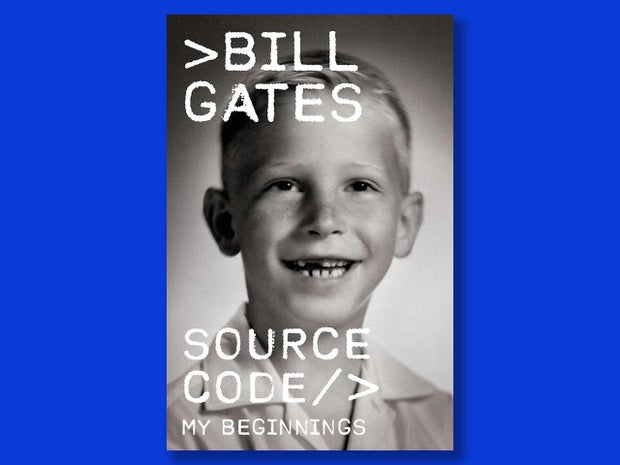Knopf
We would possibly obtain an associate fee from anything else you purchase from this text.
In Invoice Gates’ new autobiography, “Source Code: My Beginnings” (printed February 4 through Knopf), the pc pioneer and philanthropist writes of his early life, and the reviews that led him to the then-burgeoning international of computer systems.
Learn an excerpt beneath about how, in 8th grade, he found out BASIC, which offered him to the magnificence and exacting calls for of laptop code; and do not leave out Lee Cowan’s interview with Invoice Gates on “CBS Sunday Morning” February 2!
“Source Code: My Beginnings” by Bill Gates
Wish to concentrate? Audible has a 30-day loose trial to be had at the moment.
Some of these years later it nonetheless amazes me how such a lot of disparate issues needed to come in combination for me to make use of a pc in 1968. Past the jump of religion made through the ones lecturers and fogeys who were given us the terminal, and past the stroke of success that individuals had been now sharing computer systems over telephone strains, finishing this miracle used to be the verdict through two Dartmouth professors to create the BASIC programming language. Simply 4 years outdated on the time, the “Newbies’ All-purpose Symbolic Instruction Code” used to be made to lend a hand scholars in nontechnical fields get began with laptop programming. One in all its attributes used to be that it used instructions, reminiscent of GOTO, IF, THEN, and RUN, that made sense to people. BASIC is what hooked me and made me need to come again.
At the wall subsequent to the terminal, a instructor had tacked up a part sheet of paper with essentially the most rudimentary instructions to get began, together with learn how to check in and which keys to press when one thing went flawed. It additionally warned ominously that typing “‘PRINT’ WITHOUT A STATEMENT NUMBER MAY CAUSE LOSS OF CONTROL.”
The web page incorporated a pattern program written in BASIC telling the pc learn how to upload two numbers.
In a position . . .
10 INPUT X,Y
20 LET A=X+Y
30 PRINT A
40 END
That used to be more than likely the primary laptop program I ever typed in. The magnificence of the 4 strains of code appealed to my sense of order. Its immediate resolution used to be like a jolt of electrical energy. From there, I wrote the primary laptop program of my very own—a sport of tic-tac-toe. Getting it to paintings compelled me to assume via for the primary time essentially the most fundamental components of the sport’s laws. Straight away, I realized that the pc used to be a dumb device that I needed to inform each and every unmarried step it will have to take, beneath each and every unmarried circumstance that might happen. After I wrote vague code, the pc could not infer or wager what I intended. I made numerous mistakes looking to determine that out. After I after all were given it proper, the sense of achievement a long way outstripped the outcome. A sport of tic-tac-toe is so easy, even youngsters be informed it temporarily. However it felt like a triumph to get a device to do it.
I liked how the pc compelled me to assume. It used to be totally unforgiving within the face of psychological sloppiness. It demanded that I be logically constant and take note of main points. One out of place comma or semicolon and the item would not paintings.
It jogged my memory of fixing mathematical proofs. Programming does not require math talents (past the fundamentals), however it does call for the similar more or less rigorous, logical technique to problem-solving, breaking issues down into smaller, extra manageable portions. And prefer fixing an issue in algebra, there are alternative ways to write down systems that paintings—some extra chic and environment friendly than others—however limitless tactics to make a program that fails. And mine failed always. Most effective after persevering, forcing myself to assume sensible, may just I coax a program to run flawlessly.
Some other early program I wrote used to be a lunar lander sport. The issue: safely contact down a lunar lander at the moon with out crashing and ahead of you run out of gas. From that I needed to damage the issue down into steps. I needed to clear up how the sport participant moved the lander left and proper, up and down, how a lot gas it had, how briskly it burned. I additionally needed to describe what it gave the impression of and learn how to show the send in dashes and asterisks at the display.
Now not lengthy after Lakeside put in the terminal, Mr. Stocklin wrote a program that contained an unlimited loop, that means it ran incessantly ahead of anyone sooner or later stopped it—however no longer ahead of it burned via over 100 bucks of our valuable rummage-sale price range. I am not positive he confirmed his face once more in that room. It used to be a lesson to all folks.
To keep away from racking up fees, I might write out as a lot of my program as I may just with pen and paper ahead of elbowing into my position on the device. With the device offline to keep away from time fees, I might kind it in and this system would print on a roll of inch-wide paper tape. That used to be the first step. Then I might dial the telephone—the rotary dial at the facet of the terminal—and stay up for the thrill of the modem to verify that I might attached. I might then feed my tape in, and chug-chug-chug, this system would enter at a blistering ten characters in keeping with 2nd. In the end, I might kind “RUN.” Normally there used to be a group of different youngsters looking ahead to the pc, so if my program did not paintings, I might need to log out and discover a spot to kind via the place I went flawed, then wait my flip to get again at the teletype.
This comments loop used to be addictive. The sensation of having higher and higher used to be a hurry. Writing systems flowed from a mixture of talents that got here simple to me: logical considering and a capability to focal point intensely for lengthy sessions. Programming additionally stoked the power want I needed to turn out myself.
The ambience of that laptop room used to be a (most commonly) wholesome mixture of cooperation and pageant. We had been a mosh pit of teen boys all looking to outdo one every other. An opening of most effective two or 3 years is not a lot within the grand scheme of items however looks like so much when you find yourself 13, small in your age, with some indeterminate time till your enlargement spurt. Kent and I had been some of the youngest youngsters in that workforce. The assumed superiority of one of the vital older youngsters us.
I used to be an eighth-grader assured in my mind energy and satisfied that my depth intended I may just do anything else the older guys may just do—if no longer higher, then a minimum of quicker. I used to be made up our minds not to let any person get anything else on me. Kent additionally hated being put-upon through anyone else. Perhaps much more than me.
A sophomore named Paul Allen picked this up right away, and he exploited it superbly. “Invoice, you assume you might be so sensible, you work this factor out.” The ones are one of the vital first phrases mentioned to me through the one who I might cross directly to cofound Microsoft with years later.
Excerpted from “Supply Code: My Beginnings” through Invoice Gates. Copyright © 2025 through Invoice Gates. Excerpted through permission of Alfred A. Knopf, a department of Penguin Random Space LLC. All rights reserved. No a part of this excerpt is also reproduced or reprinted with out permission in writing from the writer.
Get the ebook right here:
“Source Code: My Beginnings” by Bill Gates
Purchase in the neighborhood from Bookshop.org
For more information:




